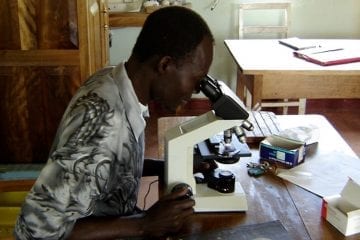Malaria Research in Kenya

Goal: The goal of this study is to understand how changes in malaria transmission, and particularly a sharp decrease in malaria transmission, affects immune responses to malaria, and to assess whether a decrease in specific responses may lead to increased future susceptibility to malaria.
Award Number: 17-A33
Funding Agency: Riley Children’s Foundation
PI: Chandy John; Site PI: George Ayodo; Co-investigators: Lindsey Turnbull, Stephen Munga
Dates: 01/01/15 – 12/31/20
Sites: Kisumu and North Nandi County, Kenya
Goal: The primary objective of this study is to accurately understand the species composition and bionomic characteristics (feeding and resting behaviors – as they relate to both interventions in use as well as human behaviors) of Anopheles vectors in the Kenyan Highlands towards developing and optimizing intervention strategies.
Award Number: N/A
Funding Agency: Indiana CTSI
PI: Neil Lobo; Co-PI: Chandy John; Co-investigators: Lindsey Turnbull, George Ayodo, Stephen Munga
Dates: 04/01/19 – 03/31/20
Sites: Kipsamoite and Kapsisiywa, Kenya